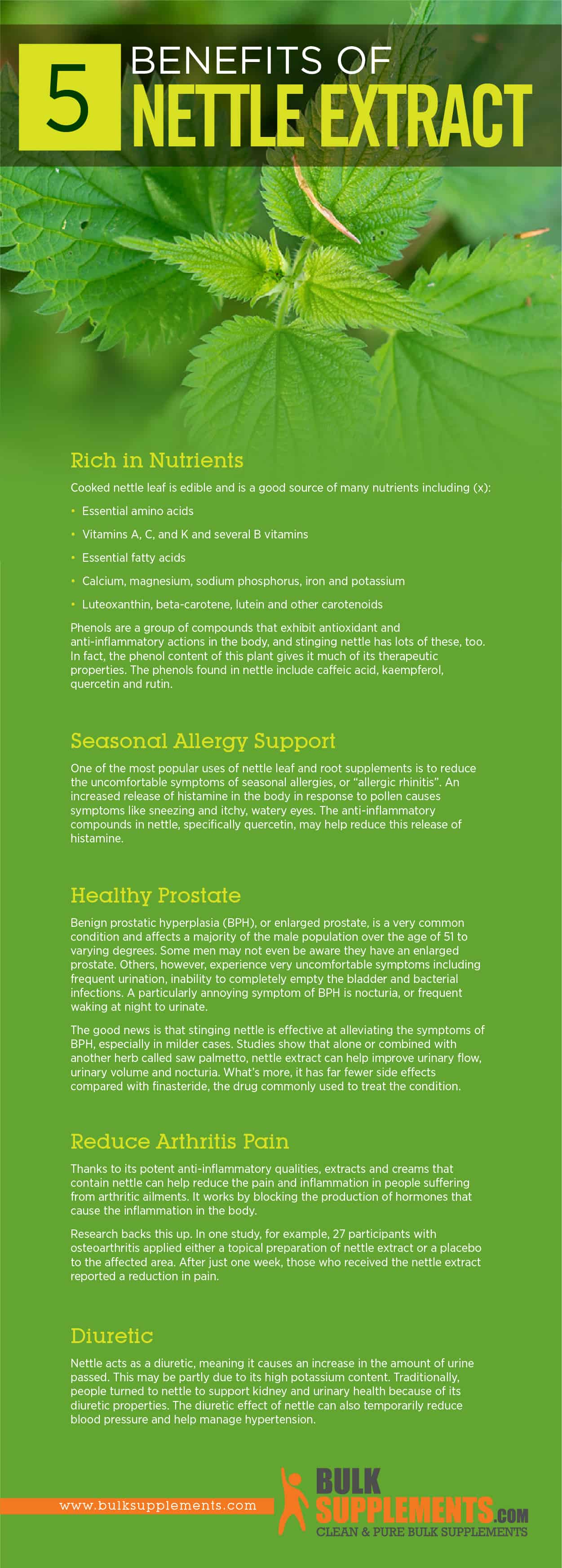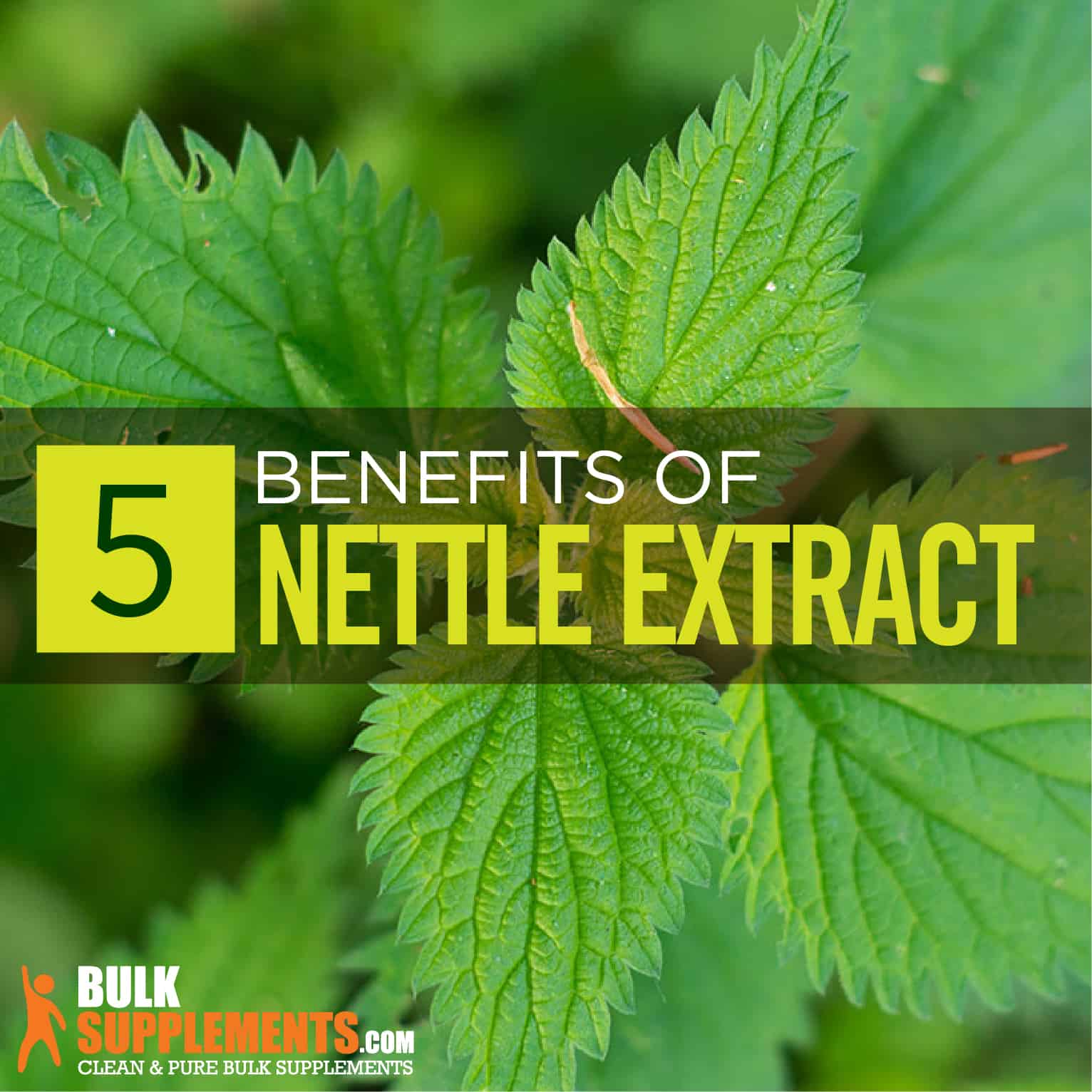What is Nettle?
Nettle, also known as stinging nettle, refers to a natural-looking herbaceous plant with potent medicinal qualities. The botanical name for stinging nettle is Urtica dioica. Several related subspecies grow abundantly throughout the world. Chances are you’ve already encountered this natural plant as it grows in wooded areas, yards and even some urban areas.
History of Nettle
Native to Europe, Asia, northern Africa, and America, the plant thrives in moist soil. Nettles grow in every state in the US except Hawaii. The first historical evidence of using nettle was during the Bronze Age. It was not for medicinal purposes but as a weaving material like sails, sacks, and paper. However, for over two thousand years, people consumed it as a fresh leaf or in soups during this age. It treated poisonings, wounds, and bites, including smoking it to relieve asthma. (x)
The Egyptians made infusions to treat arthritis and low back pain. The Greeks had many uses, such as a laxative and treating spleen illness. (x)
During both World Wars, farmers feed their livestock nettles because of the shortage of nutritional feed. The plant offered vitamin A and protein. It even made the chicken eggs yolk more yellow because of the rich carotenoid value, orange, yellow, red fat-soluble pigments, in the nettles. (x)
Other notable historical facts about nettle include the use as a hair tonic, blood purifier, treat scurvy, and a vegetarian solution for rennet in cheese-making. Even used it to treat paralysis, comas, chickenpox, nosebleeds, typhus, and cholera. (x)
Before you go off and pick yourself some nettles to remedy your health concern, discuss with your healthcare provider any new supplement you want to try.
How is Nettle Used Today?
There are many ways to use the stems, leaves, roots and even the “stinging” hairs of the nettle plant. The leaves and roots are edible and eaten like other vegetables or made into tea. Alternatively, extracts of the leaves and roots help the body when taken orally or added to topical creams.
This plant may seem ordinary and appears as a weed in some places. But its pharmacological qualities are extraordinary. It can help calm symptoms of seasonal allergies, promote urinary health, and reduce inflammation.
A friendly word of caution — while stinging nettle provides many health benefits, it’s called “stinging” for a reason. The tiny hairs on the leaves, called trichomes, create a stinging sensation on the skin. Cooking and processing neutralize the plant but use gloves when handling it in nature. (x)
Nettle Benefits
Rich in Nutrients
Cooked nettle leaf is edible and is a good source of many nutrients including (x):
- Essential amino acids
- Vitamins A, C, and K and several B vitamins
- Essential fatty acids
- Calcium, magnesium, sodium phosphorus, iron and potassium
- Luteoxanthin, beta-carotene, lutein and other carotenoids
Phenols are a group of compounds that exhibit antioxidant and anti-inflammatory actions in the body, and stinging nettle has lots of these, too. In fact, the phenol content of this plant gives it much of its therapeutic properties. The phenols found in nettle include caffeic acid, kaempferol, quercetin and rutin (x, x).
Seasonal Allergy Support
One of the most popular uses of nettle leaf and root supplements is to reduce the uncomfortable symptoms of seasonal allergies, or “allergic rhinitis.” An increased release of histamine in the body in response to pollen causes symptoms like sneezing and itchy, watery eyes. The anti-inflammatory compounds in nettle, specifically quercetin, may help reduce the effects of histamine release. (x) (x)
While many allergy sufferers use nettle for this purpose, does it work? Studies on humans yield mixed results. In one study, a nettle supplement improved allergy symptoms. In other cases, researchers did not find this. (x) (x)
Animal studies proved more positive results and support nettle inhibiting and blocking factors in the body that cause allergies. Another human study supported the positive results with 69 individuals tested. Of those, 57% reported it was effective, and 48% was more effective than previous allergy medications. (x)
More research is necessary to understand precisely how it works. However, since allergies are so common and can feel awful, some people may find that even mild relief of symptoms makes the supplement worthwhile.
Healthy Prostate
Benign prostatic hyperplasia (BPH), or enlarged prostate, is a very common condition and affects a majority of the male population over the age of 51 to varying degrees. Some men may not even be aware they have an enlarged prostate. Others, however, experience very uncomfortable symptoms including frequent urination, inability to completely empty the bladder and bacterial infections. A particularly annoying symptom of BPH is nocturia, or frequent waking at night to urinate.
The good news is that stinging nettle is effective at alleviating the symptoms of BPH, especially in milder cases. Studies show that alone or combined with another herb called saw palmetto, nettle extract can help improve urinary flow, urinary volume and nocturia. What’s more, it has far fewer side effects compared with finasteride, the drug commonly used to treat the condition (x, x).
Reduce Arthritis Pain
Thanks to its potent anti-inflammatory qualities, extracts and creams that contain nettle can help reduce the pain and inflammation in people suffering from arthritis ailments. It works by blocking the production of hormones that cause the inflammation in the body (x, x).
Research backs this up. In one study, for example, 27 participants with osteoarthritis applied either a topical preparation of nettle extract or a placebo to the affected area. After just one week, those who received the nettle extract reported a reduction in pain (x).
Another study demonstrated the efficacy of an oral nettle preparation. Here, participants reported less pain from osteoarthritis of the knee and hip and a reduced need for nonsteroidal anti-inflammatory drugs (x).
Diuretic
Nettle acts as a diuretic, meaning it causes an increase in the amount of urine passed. This may be partly due to its high potassium content. Traditionally, people turned to nettle to support kidney and urinary health because of its diuretic properties. The diuretic effect of nettle can also temporarily reduce blood pressure and help manage hypertension (x, x, x).

Ways You Can Add Fresh Nettle to Your Diet
- There are many ways to add fresh nettle to your diet. Feeling ambitious in the kitchen? Try this recipe, or this one, or any of these!
- Alcoholic nettle beer is consumed in the British countryside.
- The Brits do love their nettle! Dorset, England hosts an annual World Nettle Eating Championship.
Where to Buy Nettle?
You can purchase nettle extract at BulkSupplements.com. The company is an industry-leading manufacturer and distributor for pure dietary supplements. BulkSupplements.com is not just a consumer brand. It also supplies pure ingredients to other food and supplement brands to make their products. All products at BulkSupplements.com are manufactured and tested according to current and proper manufacturing practices.
Are you interested in trying nettle extract? Contact BulkSupplements.com to place an order.
Nettle Extract Dosage
A clinical trial performed on 287 men showed a reduction of prostate concerns. Based on that study, a blind study of 100 BPH patients with fifty given a placebo and fifty given two 300 mg capsules of nettle (extract) twice a day. The group taking the nettle became better. (x) However, a study involving allergies had 100 people with allergies. Fifty took a placebo, and fifty took 150 mg of a nettle supplement four times a day, including a saline nasal rinse. The results were positive, with more research needed to determine its exact effectiveness. (x)
Based on the above studies and what your supplement label suggests, you can safely take 600 mg a day. It’s best to check with a medical practitioner for a more valid recommendation.
Nettle Side Effects
Side effects are minimal. They can include experiencing a mild upset stomach to a sudden drop in blood pressure. (x)
Pregnant people should not take nettle, and those who take diuretics or medication for blood pressure or diabetes should consult with a healthcare professional before using it.
Otherwise, there are no reported serious side effects when patients take nettle extract. (x)
The Bottom Line
Whether cooked and eaten fresh, consumed as a tea or taken as an extract, nettle provides lots of vitamins, minerals, antioxidants and anti-inflammatory nutrients. For centuries, people used it to treat all kinds of conditions from spleen infections to purifying the body.
Modern research also shows that it can be an excellent addition for managing allergies, arthritis, urinary health, benign prostatic hyperplasia (BPH) and high blood pressure.
The statements in this article have not been evaluated by the Food and Drug Administration. These products are not intended to diagnose, treat, cure, or prevent any disease.


